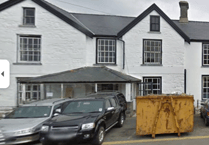From the end of the First World War in November 1918 until the fall of the last Liberal-led government in October 1922, Margaret Lloyd George, wife of David Lloyd George of Llanystumdwy , “the Man who Won the War”, pursued an unprecedented series of political campaigns between all compass points of England and Wales.
It was unprecedented for a First Lady to campaign on the political hustings, except in their husband’s own constituency. By and large, it has never been repeated in this manner.
The Campaigns of Margaret Lloyd George, published on 24 October – almost a century to the day after Lloyd George’s departure from 10 Downing Street at the hands of a vote at the now-labelled 1922 Committee – tells this unique story in the words of Margaret Lloyd George herself, and in the words of the press that followed her tours.
Dr J Graham Jones, Director Emeritus of the Welsh Political Archive at the National Library of Wales, writes in his foreword: “The authentic voice of Dame Margaret Lloyd George comes through loud and clear.”
The book draws on an unpublished treasure trove of speeches, notes and correspondence, in her hand and in the hand of her private secretary, Rev J T Rhys (grandfather of the book’s author, Richard Rhys O’Brien), and others.
The political campaigning began with her whirlwind two weeks during the controversial December 1918 general election, on one Saturday travelling 95 miles across south Wales, seeing 20,000 people, addressing 10 meetings – four in the open air – speaking in English and Welsh- in four different constituencies.
Over the next four years she campaigned in as many by-elections as was practicable.
For example, in 1919 she addressed large crowds in Plymouth on the eve of the election of Nancy Astor, the first woman to take her seat in the House of Commons.
In February 1921 her campaigning tipped the scales in favour of Lloyd George’s Liberal candidate against the Asquithian Liberal in the Cardiganshire by-election, an election that widened the rift in the Liberal Party.
In July 1922 she swept through the South West, from Bristol to Redruth, returning to Downing Street to petition her husband on behalf of the Cornish tin miners.
This was a time of seismic shifts in British politics, as the Liberals feuded and as the Labour Party edged towards their eventual first government in 1924.
The time was right for her interventions: in 1918 women for the first time had gained the vote.
Furthermore, her husband, as soon as the November 1918 Armistice was signed, was plunged into negotiating the peace, culminating in the controversial Versailles Treaty in July 1919.
Thereon he was focused on rebuilding the country, build “homes for heroes” and dealing with increasing industrial strife as the economy slowly recovered. His wife took his message around the country.
Alongside her political activities Mrs Lloyd George continued her humanitarian campaigns, for education, for women’s rights, for temperance, for new hospitals for the war casualties, for pensions for the soldiers and sailors, all following on from her wartime campaigns for the troops, for which she was made a Dame in 1920. Known thereon as Dame Margaret, she nonetheless generally preferred the simpler ‘Mrs Lloyd George’.
Aside from the good fortune of inheriting such a valuable archive, Richard has been inspired to write this story to restore the public reputation of Margaret Lloyd George, so strong a century ago, which has been largely forgotten, many merely remembering a little Welsh woman who preferred to be at home in Cricieth, North Wales and who, it is often erroneously stated, took little interest in national politics.
Perhaps for good reason, no spouse of a Prime Minister has conducted such open political campaigning since the pioneering Mrs Lloyd George, though some have worked hard in the background.
In his introduction, Richard, who is pictured above, writes: “The role of a Prime Minister’s partner is undefined, in theory allowing each holder of the office to fashion it at will - but minefields as well as opportunities abound.
“Mrs Lloyd George seized the opportunities and avoided the minefields with great skill, and while she only too often exhausted herself, she never over-reached.”
After the fall of Lloyd George from power a century ago Mrs Lloyd George continued her humanitarian work, as well as helping both her son Gwilym and her daughter Megan (the first Welsh woman at Westminster) to join their father on the back benches of the House of Commons.
She died on 20 January 1941, at home in Cricieth, after a fall and subsequent illness.
The book closes with the generous comment made in 1922 by an otherwise opposing Asquithian Liberal: “Dame Margaret is so obviously what we may all desire to be, a real good woman doing her utmost to tread worthily the path in which the fates have placed her.”
The Campaigns of Margaret Lloyd George by Richard Rhys O’Brien is published by Y Lolfa.



.jpeg?width=209&height=140&crop=209:145,smart&quality=75)

Comments
This article has no comments yet. Be the first to leave a comment.